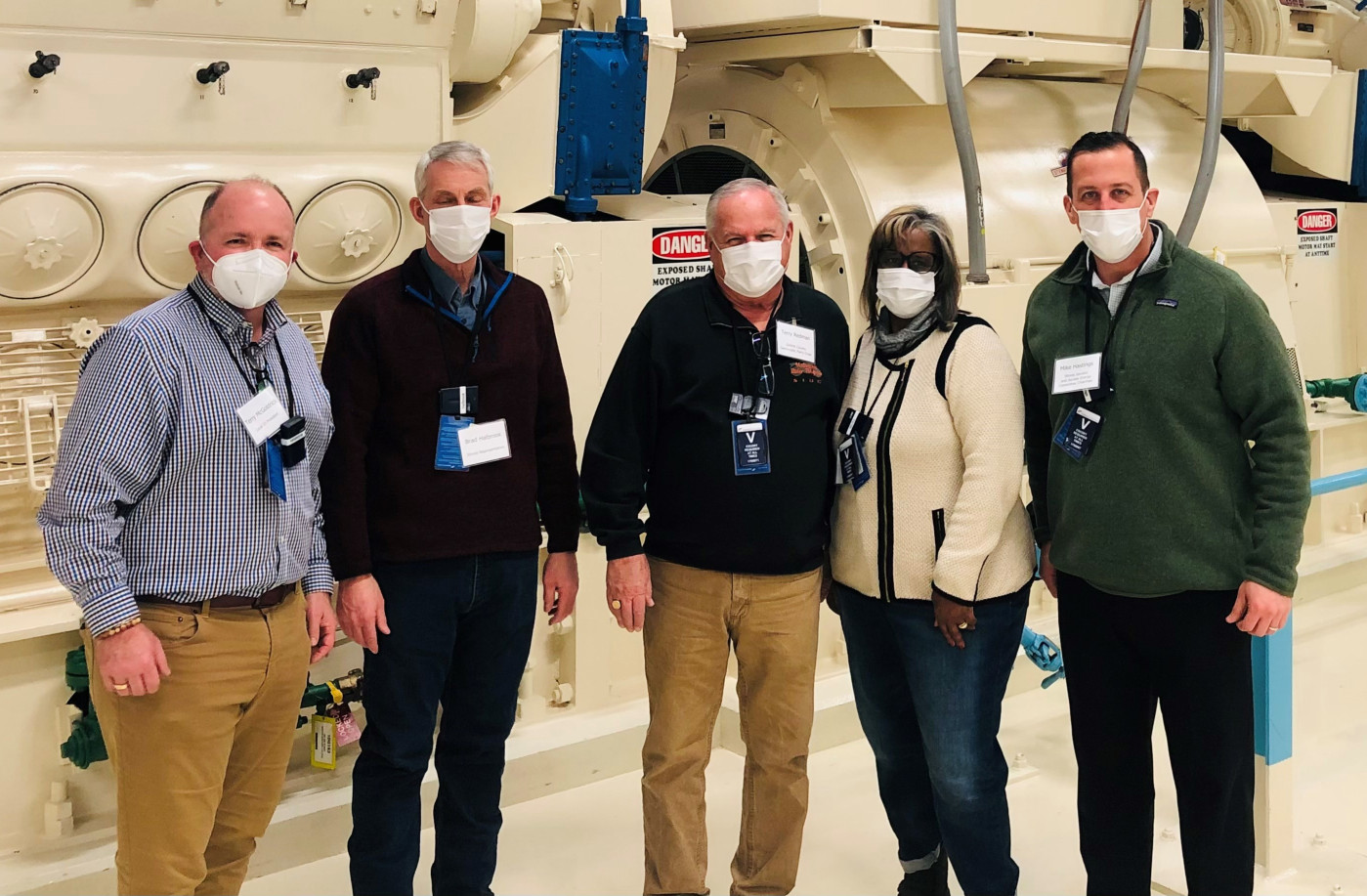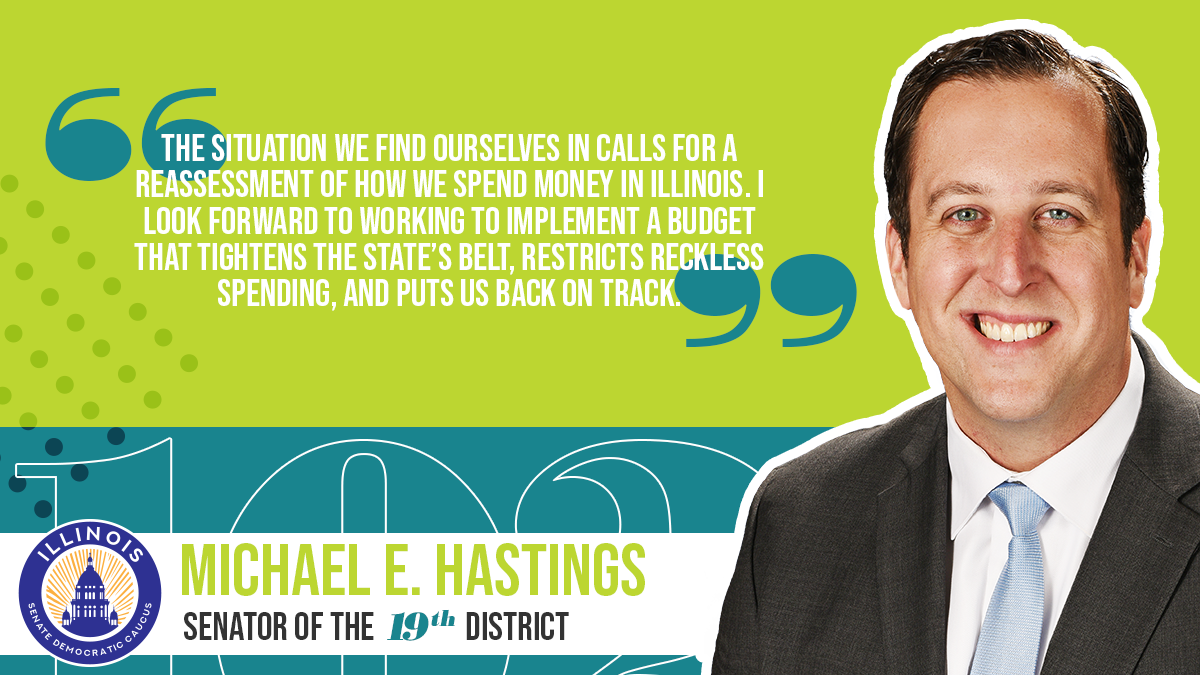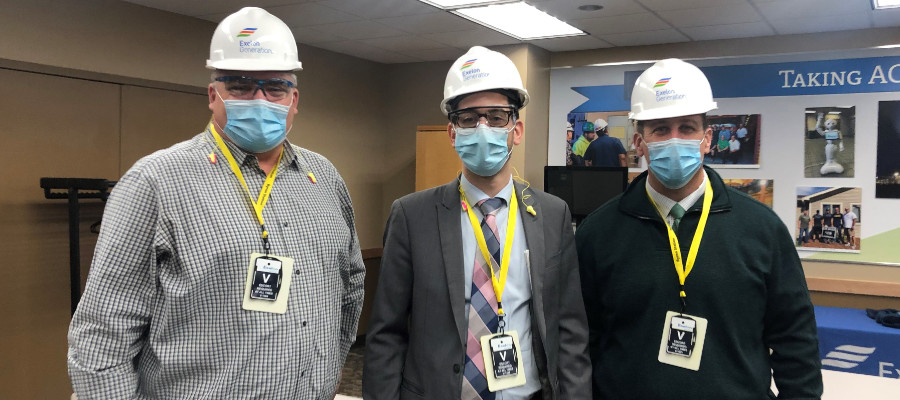Hastings, Turner visit Clinton Power Station to discuss Illinois’ clean energy future
- Details
- Category: Featured Stories

CLINTON – State Senator Michael E. Hastings (D-Frankfort) and State Senator Doris Turner (D-Springfield) traveled to the Clinton Power Station Thursday to tour the facility and meet with employees.
“As a devastating energy crisis unfolds in Texas due to winter storms, consumers are experiencing skyrocketing natural gas prices. This demonstrates how essential our nuclear fleet is to reliable energy production in Illinois,” said Hastings, who serves as chair of the Senate Public Utilities and Energy Committee. “Rest assured, when the time comes, I will be prepared to do everything it can to protect our existing clean energy infrastructure.”
This is Hastings’ sixth power plant tour in recent months, as his committee begins its work this spring on the future of the state's energy policy. Exelon has indicated it will close more nuclear plants this year unless it receives additional aid, and state lawmakers are expected to discuss the future of clean energy in Illinois thoroughly this session.
Joining Hastings on the tour was State Senator Doris Turner (D-Springfield).
“The situation in Texas serves as a harsh reminder of what can happen when state government neglects existing energy infrastructure while also failing to innovate. Everyday Texans are still enduring unusually frigid temperatures without access to heat and water. This simply cannot be allowed to happen in Illinois,” Turner said. “I look forward to working to ensure that our state’s energy infrastructure remains state-of-the-art, implement training programs for people transitioning to a job in a new energy sector and protect existing, good-paying jobs Downstate.”
The Clinton Power Station has the ability to generate nearly 1,069 net megawatts, enough electricity to power about 1 million average American homes. The 5,000-acre cooling lake is formed by a dam built at the convergence of Salt Creek and the North Fork of Salt Creek. The station serves as an economic driver for numerous Downstate communities, contributing $13 million in property taxes annually. Clinton also supports 2,100 direct and secondary jobs in Illinois.
Hastings: We must remain focused on assisting small businesses, providing critical services and putting people back to work
- Details
- Category: Press Releases

FRANKFORT – Following Governor JB Pritzker’s annual budget address, State Senator Michael E. Hastings (D-Frankfort) offered the following statement:
“The proposal outlined by Governor Pritzker today is just the start of what will certainly be a challenging negotiation process. The COVID-19 pandemic has presented our people with generational economic challenges, and there is no question that this is going to be an incredibly difficult year for the state of Illinois. That is why our focus must be providing critical services to the people we represent, improving the unemployment system, assisting small businesses impacted by the pandemic, and putting people back to work through investment in infrastructure projects.
This is going to be a delicate budget making process, but the situation we find ourselves in calls for a reassessment of how we spend money in Illinois. I look forward to working to implement a budget that tightens the state’s belt, restricts reckless spending, and puts us back on track.”
Hastings: Generational challenges require creative solutions
- Details
- Category: Featured Stories

SPRINGFIELD – State Senator Michael E. Hastings (D-Frankfort) will continue to serve on Senate President Don Harmon’s leadership team as Majority Caucus Whip during the 102nd General Assembly.
“I am deeply humbled President Harmon has given me the distinct honor of continuing to serve on his leadership team,” Hastings said. “While our state faces challenges not seen in generations, I have no doubt that under his leadership we will give our people the relief they deserve by implementing solutions in an effective, bipartisan manner.”
Hastings was appointed to Senate President Harmon’s leadership team to serve as Majority Caucus Whip in 2020. In this role, Hastings works closely with fellow caucus members on policy issues and offers advice on their respective legislative agendas. Hastings will also continue to serve as chair of the Senate Public Utilities and Energy Committee.
“We have our work cut out for us in 2021,” Hastings said. “In addition to providing our communities with the tools necessary for an effective and efficient COVID-19 response, we need to consider solutions that secure the future of clean energy in Illinois. That starts with investing in existing infrastructure and preserving the good-paying jobs in our communities.”
In the coming months, Hastings hopes to help foster bipartisan collaboration on key issues, including equitable clean energy solutions, implementing ethics reform to restore the public’s trust in government, and increasing support for small businesses and families struggling during the pandemic.
Hastings has served the 19th Legislative District since 2012, when he was elected as one of the youngest Senators in state history. Since then, he has worked tirelessly to pass legislation with the goal of improving the social and financial climate of the state of Illinois.
Hastings joins Rockford Mayor Tom McNamara in Byron to discuss the future of clean energy in Illinois
- Details
- Category: Featured Stories

BYRON – Continuing a statewide fact finding mission, State Senator Michael E. Hastings (D-Frankfort) traveled to Byron, Illinois to meet with local leaders and plant employees to discuss future prospects for Illinois’ clean energy infrastructure today.
“As the spring session looms and our legislative priorities come into focus, major questions about the future of our state’s clean energy infrastructure need to be asked,” said Hastings, who serves as chair of the Senate Public Utilities and Energy Committee. “How do we invest in our clean energy future and preserve the good-paying jobs in our communities? I have traveled to power plants in every corner of our state in search of these answers, and I am privileged to have been given the opportunity to meet with the folks in Byron today as a part of that mission.”
Featuring iconic twin cooling towers overlooking the Rock River Valley, the Byron Generating Station's two nuclear reactors supply power to 2.3 million homes each year. For nearly 30 years this power plant has provided thousands of good-paying jobs and generated billions of dollars in economic support, including about $38 million in taxes annually for schools, roads and other public services.
“Working families in Northern Illinois have depended on power plant jobs as a path to the middle class for decades. We need to do everything we can to keep the power plant in Byron open,” Rockford Mayor Tom McNamara said. “The number of jobs and the ancillary economic impact provided by the plant is essential for growth to continue in Rockford and the surrounding communities.”
Hastings expects major energy legislation to be considered during the spring legislative session.
More Articles …
Page 45 of 57



